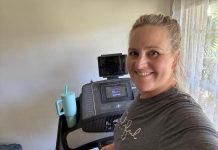
You always remember your firsts…
The good ones.
The bad ones.
And especially the ugly ones.
Personally, I will never forget our first deployment. Now, this probably requires a bit of back story to fully understand, but I’ll keep it brief.
My husband joined the Navy later in life. In fact, he celebrated his 31st birthday the week before graduation. Our oldest son and I, newly pregnant with our second child, drove him to MEPS to see him off. We actually didn’t get to attend his graduation. I was still wrapping things up at my job, and we both agreed that it would be worse for our autistic son to only see daddy for a few hours than to not see him at all.
Anyway, we were pretty settled into military life by the time his first deployment came around. We had moved three times in three years, thanks to lovely change of homeport shifts, and had welcomed our third child.
But the military always seems to find a way to complicate things at the worst possible time. For us, we were 6 months into our journey to finding out what exactly was going on with our daughter. She was 2.5 years old, non-verbal, not very communicative, and struggled to learn what seemed like basic skills. She had been diagnosed with Autism 6 months prior, but it didn’t feel right. My “mom gut” told me that Autism wasn’t the final answer. Days after finally getting to meet with the geneticist and start the process for full genetic testing, my husband came home to tell us that his deployment had been moved up.
I was devastated. Angry. Overwhelmed.
And scared.
I had never solo parented my children for that long. Our daughter was going through testing. How was I going to be able to handle it all? I told myself it didn’t matter.
Most important and time sensitive things first. I called the geneticist and told her that if she wanted my husband’s blood for comparison to our daughter, we were working with a much shorter timeframe than expected. She had the order in immediately. Looking back, I can’t remember if we went in that same day or the next, but we got it done.
Then he left.
We still hadn’t gotten answers for our daughter and knew that we might not, even with the testing.
Then, just under 3 weeks into deployment, my phone rang.
I will always remember the moment. It was a call that we were hoping for and dreaded all at the same time. Would we have answers? Would they be answers we wanted? What if it’s terminal?
I will never forget the sympathetic tone the doctor used when delivering the news about our daughter’s results: CASK Gene Disorder.
I can tell you that I ran through a million different emotions. To hear things like, “she is unlikely to ever be able to live on her own” or that others diagnosed with this disorder “rarely learn to talk” was devastating. I was able to hold it together through the call, made one more call to get it off my chest, and then I sobbed. Once I got the cries out and made contact with my husband on the ship with the news, we hit the ground running.
Over the next few weeks, our daughter went through a battery of medical tests to give us information on the different areas that her CASK could impact. Every single test came back normal, with the exception of her head circumference. It felt like we learned nothing, but that was just the naïve thought of an overwhelmed mother.
Looking back over the last year, receiving her diagnosis has been a blessing. It has given everyone around her a greater understanding of her needs, even if we live in a constant state of “I don’t know” when it comes to CASK. It has led our family to an amazing community to look to and support along this journey. Most importantly, it has allowed our daughter to shine.
This journey also taught me a lot about myself and how to handle adversity.
That is what I want to share with you!
- Lean on your village
When my daughter got her diagnosis, that first call I made was to a close friend. I didn’t know how I would be able to get the news out. I hadn’t said the words out loud yet. I needed a safe space to land if I couldn’t do it. Someone that wouldn’t get upset with me when I told them to stop asking questions, no matter how harshly I said it. She was my trial run for how I would deliver the news to my husband.
She was also the one who was there to help watch my boys when I took my daughter in for the many follow up tests she needed. She was the person I called when I doubted myself in this process and when the overwhelm crept up. I shared some with my husband, but I also wanted to protect him from it as much as I could. He was gone and there was nothing either of us could do about that. He was also coping with it all, and without the luxury of being able to hug our daughter or see her amazing progress. I am forever grateful for her and she will always have a place in our family.
2. Admit that you can’t do it all
What I failed to mention earlier is that our oldest also experienced some therapy related trauma right after my husband left. I was so consumed with regulating my own emotions, while trying to help him through his trauma, and also make sure my daughter got everything she needed that things got pushed to the side. My house wasn’t getting cleaned as regularly and we were surviving on meal kits. I did not have the mental capacity for cleaning and grocery shopping. In those heavy, overwhelming moments where it all seemed like too much, something needed to give. I left dishes in the sink because I was too overwhelmed to empty the dishwasher. I waited until the morning to sweep up the mess my kids made during dinner. Our playroom was often a disaster that I left untouched for days. I promise that once things settled in, I was able to clean but it was on my terms and when I had the capacity for it. The meal kits never stopped though. They were a luxury I would not have survived without.
3. Forgive your spouse
We are on a unique journey as military spouses. We often have to do things on our own. Sometimes, when things get really hard, we want to place blame when our person can’t be there to provide us with the support that we crave. I know that my husband would have given anything to be there that day for that phone call. He would have been by my side as we deliver the news to our family. He would have done whatever he could to assist with her medical tests, whether he was taking her himself or watching our boys so that I could take her.
But he wasn’t there. He was in a ship, fulfilling his duty to the Navy. He has as much of a duty to his country as he does to his family and he wasn’t in a position to choose. So the choice became mine: hold it against him, or understand that he didn’t have anymore choice in this than I did.
4. Channel your energy for good
I know for me, when I’m in a storm like this, I try anything and everything to gain a foothold on some control. Neither of my children will ever be cured, and I’m not sure I would want them to be. What I do want is for them to have the best life possible. Instead of living in a world where I view my children’s disabilities as a curse, I chose to take the path of making a world where they can shine. I started to research. I found parent support groups. I channeled my energy into awareness, advocacy, and acceptance. I can’t change my kids, nor do I want to, but I can make a positive impact on how they interact with the world. This helped me feel in control of something that is uncontrollable and it feels good to wake up every day knowing that I’m doing something that will help others.
5. Don’t forget to prioritize yourself
This is probably the hardest one for us as moms. When you give birth and you hold that little bundle in your arms, you immediately know that you would move mountains for them, even if you break your back in the process. What we forget, especially in those moments of overwhelm, is that we can’t provide support to others when our cup is empty. One of the ways I chose to prioritize myself during my storm was therapy. I found a provider that allowed for later hours and did telehealth. I would get my kids to bed a little early and meet with my therapist from the comfort of my couch.
I also made a promise to myself that I would do something by myself, for myself, every 4-6 weeks. I know it’s pretty spaced out, but when you are flying solo, child care can be hard. I would get a pedicure and listen to a podcast. I would get a nice meal and park my car somewhere with a view to eat in silence. I would treat my mom mobile to a fancy car wash. I would walk aimlessly around Target with a coffee. It didn’t matter what I was doing, as long as it helped me to clear my head and let go of some of the stress.
Our first deployment was a whirlwind of bad and ugly, a tornado inside of a hurricane. Before it started, all I could see where the clouds looming and I didn’t think I would survive. When we were in it, and especially when the storm got heavy, I was barely making it day to day.
Looking back I realize that I was stronger than I ever thought I could be. The storm could only bring me down if I let it, and I wasn’t about to let that happen. I learned more about myself in those months then I had in the many years prior and I choose to be grateful for those lessons. I found the good in my storm and I hope that others are able to do the same.











